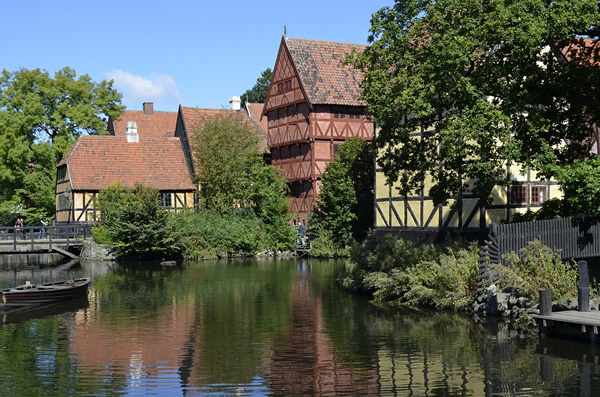Study Abroad in Denmark
There are Many "Cozy" Options in a Country of English Speakers
By Heather Wynn

|
|
The old town of Aarhus, Denmark.
|
Before visiting Denmark for the first time I noticed that all the Danes I met used the same adjective when describing their country: “cozy.” Once I arrived in the city of Aarhus, it only took a few moments to
understand why.
Small, comfortable candle-lit cafes line the cobbled streets, giving the city the feel of a village. The people are friendly and easygoing and not at all reluctant to strike up a conversation with whoever is sitting at the
table next to them. The atmosphere truly was cozy and I realized that there really was no better word to describe the feel of Denmark.
I was amazed by the Danes’ English proficiency. With a population of less than 5,500,000 people, it would be much too expensive to use voice-overs for English films and television programs, so Danes basically grow
up with English as a second language.
The widespread use of English in Denmark can also be a great advantage for American students who hope to study abroad but lack the sometimes necessary language competency. The translation of university textbooks from English
to Danish is another cost the Danes choose to spare themselves, and often professors teach their courses in English to keep with the textbooks.
International students have three enrollment options at the University of Aarhus:
► They can enroll as undergraduates in degree programs, but Danish proficiency is required.
The two remaining options for enrollment require no previous knowledge of the Danish language:
► Advanced undergraduate students can enroll as guest students for one to two semesters and attend the courses of their choice. It is a good idea
to talk with your advisers to figure out how much of your coursework will transfer back.
► The third option is to enroll for a master’s degree in one of the programs offered in English. The Univ. of Aarhus offers programs such
as Economics, European Studies, and Psychology. Other Danish universities offer similar programs in English.
You can expect living costs of about $800 to $900 per month, not including the $150 to $500 per semester for textbooks and course materials. Although international students are allowed to work during their studies in Denmark, it is difficult but not impossible for non-Danish speakers to find work. Your best
bet is to start the job hunt well in advance of your departure if you require the extra income during your stay.
A visa must be obtained before arrival. If you are interested in working during your stay, you will need to apply for a work permit at this time as well. Visa and work permit applications are processed through the Danish
Embassy or Danish consulates in the student's home country. Here is the link to the embassy of Denmark in the U.S. Students arriving with no visa (Americans can stay in Denmark for up to three months without a visa) will not be able to obtain a residency permit in Denmark, so it is important to make sure this gets done prior to your departure.
Accommodations can also be arranged prior to your arrival. Denmark's International Secretariat offers different housing options for international students, either in residence halls or private accommodations.
Although many classes at Danish universities are taught in English, many are not. This need not be a problem if your heart is set on a class that is being taught in Danish. Simply ask the professor if he or she would be
willing to teach the course in English. Nine out of 10 times the language of instruction will be changed to English.
But just because the Danish language is not required for all study programs, do not miss the opportunity to learn the language while you are there. The International Secretariat offers an intensive 4-week language course
for international students twice yearly, in August and January, before the start of each semester. The cost of the course is approximately $400, but the insight a grasp of the language will give you into the Danish culture is priceless.
Finally, an insider's tip to university life in Aarhus: Friday classes after two o’clock are not to be found. "Friday bars" are set up weekly by different departments throughout the University. Danish students
like to get an early start to their weekends. Friday bars are a great way to meet fellow students and save a few bucks on drinks.
Heather Wynn explored the options of studying in Aarhus after visiting friends in Denmark.
|
